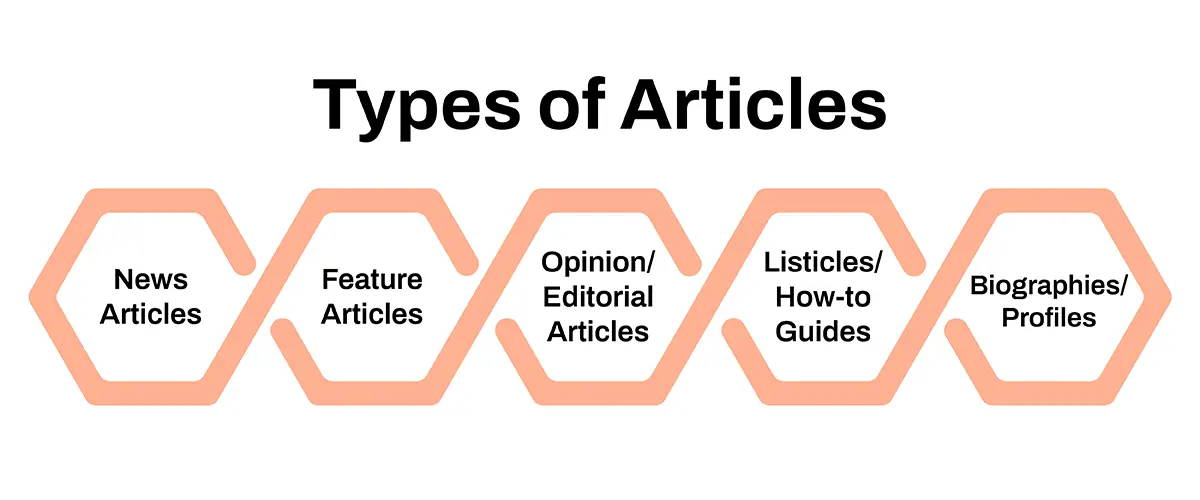Article writing is when the writer expresses a specific thought or research about a particular topic and publishes it in an electronic or print medium. The purpose of writing an article could vary; it might be a case study, a news report, a research result, or an analysis of a particular scenario. This interesting writing practice is included in the school curriculum for class 12 students to test their writing and logical comprehension skills.
So, if you need some input on article writing class 12, then you’re at the right place. In this blog, we will take you through a detailed guide on how to write articles in class 12, the format you should follow, expected questions and common mistakes while attempting these questions.
If that sounds like something you’re keen to learn, keep reading!
- ▪ Article Writing Format
- ▪ Types of Articles
- ▪ Article Writing Class 12
- ▪ Article Writing Class 12 Format
- ▪ How to Write a Good and Engaging Article?
- ▪ Common Mistakes to Avoid in Article Writing
- ▪ Article vs Blog Writing
- ▪ Article Writing Example
- ▪ Practice Questions of Article Writing for Class 12 Students
- ▪ Are you preparing for the CBSE Class 12 Board Exams?
- ▪ Wrapping Up
- ▪ FAQs
Article Writing Format

Here, we will guide you through the basic article writing format. Keep these basics in mind.
Title: First comes the title of the article. Keep it engaging and to the point so that it hooks the readers and they know what to expect from the write-up.
Introduction: Then comes one of the critical parts of the article. In the introduction, you need to introduce the topic briefly and set the stage for the rest part. The opening paragraph needs a catchy start that states a question, a stat, or anything that immediately implores the reader to read through the remaining article. If the beginning is monotonous, the reader won’t find it interesting to look for the remaining content.
Body: Now that you have hooked the readers, they have started reading your article. You need to do justice to their patience by creating a fantastic article body. You can divide it into two to three paragraphs per the requirement. Talk about the most critical points and summarize them with numbers and evidence. This is how you build a steady article that brings value and presents readers with a unique point of view.
Conclusion: Now, it is the end part. Because it’s the conclusion, you can’t lose your flow. Otherwise, the entire article will lack depth. Sum up the key points and a final thought and keep a call to action for the readers.
Remember, the entire article should be written in a clear and engaging tone. That ranks it higher on readability.
Types of Articles

There are different types of articles and here are a few of them for your understanding:
- News Articles: These types of articles cover recent events and developments with statistical and factual information. They are usually fact-based articles that inform readers about what’s happening around them, and they do not include many opinions.
- Feature Articles: These articles give an in-depth analysis of a particular topic with factual details, background, case studies, and insights. Some good examples are interviews, human interest stories and full-fledged descriptions.
- Opinion/Editorial Articles: These are analytical pieces that bring out the writer’s personal views on a topic with arguments, analysis and critique. These kinds of articles aim to provoke a thought or initiate a question in the mind of the readers.
- Listicles/How-to Guides: These types of articles are roadmaps or guides that help readers with a particular task. They are written step-by-step and have examples to better demonstrate the process.
- Biographies/Profiles: These articles focus on a particular group or organisation or a profile to talk about the respective achievements, personality traits, features etc. The aim is to give readers a detailed overview of the inside matters in the subject’s life.
Each article has different aims and engages the readers in various ways.
Article Writing Class 12
While understanding the details regarding Article Writing class 12, you must know the expected question types and the usual mark distribution. The exact criteria might differ according to the boards.
- Format (1 Mark): For how you frame the article and adhere to the format, 1 mark will be awarded to you. Formatting means writing a catchy title, keeping the body concise and having an organized conclusion. Please adhere to the standard guidelines to secure the total mark in formatting.
- Content (3 Marks): This is the most critical part of the entire marking system. If you cover the topic well, stay to the point, explain in an organized way, and include relevant examples and data, you are likely to score full marks in the content section. Make sure to follow a smooth and logical flow to avoid losing marks in this section.
- Expression ( 1 mark): This is where you’re evaluated for the proper use of grammar, vocabulary and sentence structure. So make sure you’re writing grammatically correct sentences and the sentence construction makes sense. Without appropriate grammar and style, the content won’t make any difference and your marks will be deducted.
That’s five marks in total. However, the mark distribution might vary depending on the authorities.
Article Writing Class 12 Format
For article writing class 12, you should follow a format while attempting the answer in your exams. Here’s the standard format to follow.
Title: As discussed earlier, start with an attention-grabbing title that sets the tone for the rest of the content. It must give readers a clear idea about what the article will focus on.
Byline: Below the title, the writer’s name should come. Please note that you’re not supposed to mention your name anywhere in the answer sheet. So, you can create any fictional name to be mentioned just after the title.
Introduction: The introduction needs to be clear and start with an interesting claim, question or piece of data that hooks the readers into reading the entire article.
Body: This is the part where you need to discuss the entire topic in detail, backed by evidence and stats. Don’t lose your flow; keep it as relevant as possible. This keeps the readers interested throughout.
Conclusion: The final stage is the conclusion, where you end with a final thought and leave a possible call to action for the readers. Don’t incorporate any new ideas here; this part just sums up the critical points of the content in detail.
Make sure your article is to the point and has a unique voice to stand out from the crowd.
How to Write a Good and Engaging Article?

Here, we will give you a detailed guide on writing an article that rightly captures your reader’s attention and increases your chances of scoring decent in the exams. Check out!
Understand/Research the topic properly: If you’re writing an article as an assignment, then make sure you research and study the subject well. This will help you crisply build the content. If you’re attempting an article in an exam, there’s no scope for research. In that case, ensure you understand the topic correctly before starting to write.
Have an Outline in Mind: Don’t jump directly into writing. First, create a mind outline and try to understand the points you’re going to discuss here and how you’re going to frame the article logically. A pre-decided flow will help you craft an engaging article.
Have a Simple Tone: Your article shouldn’t include long, bombastic words and stuff it with unnecessary information. Use simple language that genuinely delivers the message and connects with the readers. The simpler you keep it, the better readable it will be. The transition from one section to the other shouldn’t be dragged but smooth.
Conclude in an Organised Way: Don’t rush the conclusion else you’ll spoil the entire flow of the article. Keep it concise and end on a powerful note that provokes a new thought, idea or question in the reader’s mind.
Proofread: Make sure you proofread the entire article once to point out grammatical or factual errors. When you proofread and edit, there is less room for marks deduction.
These are the essential points that you must keep in mind. And, with more practice, you can gradually improve your writing.
Common Mistakes to Avoid in Article Writing
To make sure that your article doesn’t lack a flow and is written adhering to the guidelines, you need to avoid some mistakes. Here are a few things to keep in mind:
- Weak title: The title is the teaser for the entire article. If you put a weak or misleading title to your article, the reader is likely to be disappointed.
- Poor structure: You should keep in mind that the article needs to have a standard structure. It will lack depth if it doesn’t follow a coherent and logical pattern. Chances are that you will miss your marks in the exams.
- Complicated Language: Using complex language and hefty sentences is the worst way to ruin your article. By no means is using complex words and convoluted sentences going to contribute to a smooth article flow. So, remember to use precise wording.
- Repetition: You shouldn’t repeat words or ideas and make each sentence wordy. It brings a monotonous touch to the article and decreases the impact. Always try to stick to a crisp writing style.
These are some of the points you need to remember while writing an article and avoid mistakes.
Article vs Blog Writing

Article and blog writing serves the same purpose of informing and engaging the audience. However, there’s a difference in how they’re presented, tone and writing style. Let’s have a quick glimpse of the difference between articles and blogs.
Articles are formal and backed by in-depth research, facts and figures. The main aim is to provide the readers with educational or factual information or do a detailed analysis of a particular subject. These are usually news, research-based pieces, and features that are published in newspapers, magazines and academic sites as well. It follows a strictly professional tone. Semi-formal language can be allowed but there’s no scope for using informal language.
Blogs usually follow an informal and personal tone and are written in a conversational way to engage the audience. Here, the writer has the freedom to talk about individual experiences and opinions. Blogs are a very popular tool to enhance the online presence and engagement of a brand and build a community of trusted customers.
Both content pieces differ in style and tone. For articles, the tone is professionalism and in-depth research, whereas for blogs, it is more relaxed.
Article Writing Example
In this section, we will give you an overview of what an article usually looks like.
Write an article on the Benefits of Meditation on Emotional Health.
Effectiveness of Regular Meditation! The Key to Feel Less Anxious
By: Sunita Roy
A recent survey of 100 people states that 65% of them felt emotionally relaxed and less stressed after regularly practising meditation. The statistics are justified, as over the years, there have been multiple examples of people benefiting from mindfulness for emotional and mental peace. With the world becoming more digital and competitive these days, practising meditation would be a great way to feel less anxious and stressed. This article does an investigative study on the benefits of meditation on human health.
Benefits of Mental Health
Meditation has a lasting impact on mental health. One of the primary benefits is stress reduction. If an individual engages in it regularly, they can experience lower levels of cortisol. This is the stress hormone and a reduction in this helps people feel more emotionally relaxed. Another benefit of meditation is the improvement of the emotional well-being of an individual. A recent survey found that it promotes positive thoughts in the mind of the practitioner and helps in reducing negative thinking.
Meditation is an effective tool to manage the various symptoms of anxiety, depression and other mental health pressures that an individual might suffer from. By engaging in regular meditation, people have better control over their emotions as they feel more connected to themselves. The overall process helps build their emotional resilience.
Meditation’s Role in Improving Focus
Another advantage of meditation is that it helps individuals improve their focus and concentration. While meditating, a person can train their minds to concentrate on a single point of focus, such as their breath or a mantra. This practice is effective in strengthening the mind’s ability to stay on task and avoid potential distractions. Studies have found that regular meditation is directly proportional to improving cognitive functions. It leads to better memory and a more focused and alert mind.
People with regular meditation habits usually find it easier to finish tasks, memorise information and stay organised daily.
Types of Meditation
There are several types of meditation, each with unique benefits. Here are a few popular ones that you can try out:
1. Mindfulness Meditation: This one focuses on the present moment. The individual observes thoughts and feelings without judgment. It is an effective method for stress reduction and improving emotional clarity.
2. Guided Meditation: In this type, a guide or instructor leads the meditation, to help the participant visualise peaceful scenes or concentrate on particular thoughts. It can be suitable for beginners.
3. Loving-Kindness Meditation: This one is also known as Metta meditation. It focuses on helping individuals develop feelings of compassion, kindness and love toward themselves and others.
Conclusion
Meditation offers many mental, physical, and emotional benefits, and thus, it is a valuable practice for anyone interested in improving their overall emotional well-being. An individual can start small, select a type of meditation that suits their respective needs and commit to a routine. They can experience the sound effects of meditation. The journey of meditation is personal and unique. One should take time and enjoy the process instead of rushing.
(Note: the stats are imaginative here, used for an example purpose only)
Practice Questions of Article Writing for Class 12 Students
If you’re preparing for the exams, here are some expected topics that you could practise beforehand. This will give you the opportunity to strengthen your research and improve your writing skills.
1: Write a feature article in about 500-700 words about the utility of Yoga among teens.
2: India has lost its first-ever test series on home ground in the last 12 years. Write an in-depth news report regarding the incident.
3: Write an article about how the increase in social media usage has impacted kids aged between 7-11 years.
4: Recently, the state was hit by a cyclone. Several health and relief camps are in the scenario. Create an investigative report about the effects, casualties, measures taken and the work going on.
5. Write a detailed guide for beginners on how to use kitchen essentials.
6. Why is personal hygiene important? Write an elaborate essay with relevant case studies.
7. Is Science a curse or boon? Illustrate with suitable examples.
8. Write an article on the impact of climate change on humans and animals.
9. A big school in the country has recently completed 100 years. Write a feature on how the celebration ceremony was organised, the events that took place, the attending guests and the history behind the legacy.
10. Write a detailed article on the effects of deforestation on the environment.
Are you preparing for the CBSE Class 12 Board Exams?
Before we conclude, here’s something you should not miss out on. If you’re a final-year board student in class 12 then don’t forget to check out Oswal Publishers CBSE sample paper bundle. The papers are designed to
- Help you have a clear understanding of the expected questions in the exams.
- Help you give a feel of the actual exam scenario and make you ready for the showdown.
- Answers are included to help you evaluate your overall standing about a particular topic. You can revise accordingly and work on the potential areas of improvement.
Make sure you grab the offer before it ends!
Also Checkout:
CBSE Question Banks Class 12 for 2025 Board Exams
CBSE Solved Papers Class 12 for 2025 Board Exams
Wrapping Up
With that, we conclude our discussion on the essentials of article writing in class 12. Make sure you follow the guidelines and develop a habit of practice at home. This way, you’ll be in a good position in the exams and can secure full marks for article writing.
And, for any assistance, Oswal Publishers is always there as the one-stop guide to your academic needs! We wish you the best for your exams.
FAQs
Q1. What is Article Writing?
Ans – Article writing is usually an investigative report, a news article or a feature on a particular topic backed by real-life evidence and factual data.
Q2. Are articles and blogs the same?
Ans – Both articles and blogs are for informing people but differ in tone and style. Blogs follow a conversational and informal structure, but articles are in-depth and have a formal or semi-formal tone.
Q3. What is the format for writing an article?
Ans – Article writing starts with a title, followed by a byline, a body and a conclusion.
Q4. What are the markings for article writing?
Ans – Marks might vary depending on the board or school. Articles are usually evaluated based on the student’s presentation of the content, style and expression.


